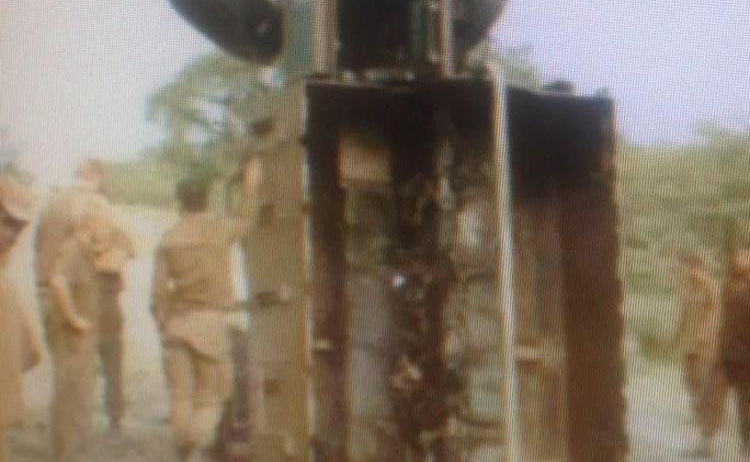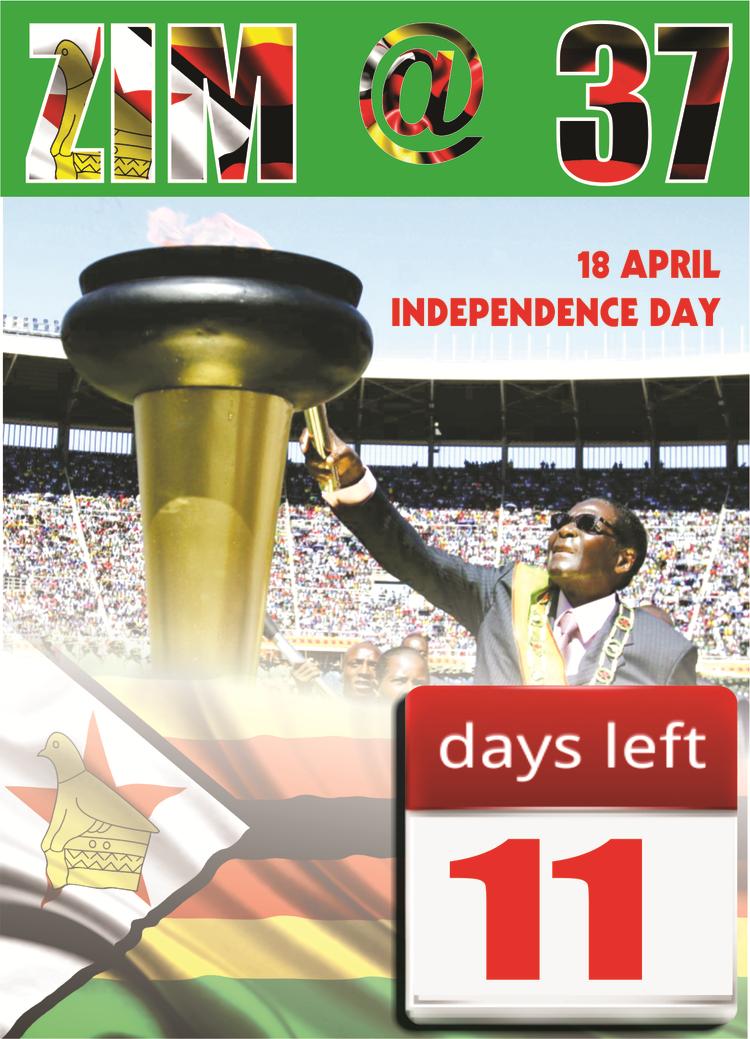
The ManicaPost

Freedom Mutanda and Sifelani Tonje Post Correspondents
We are a week and a half away from the day we commemorate our Independence Day.
We are counting down towards the big day when Uhuru was officially proclaimed as the imperial British flag came down and in its place, the newly independent Zimbabwe’s flag.
Certainly, we rejoice in the knowledge that for the past 37 years, we have been placed among the group of self governing countries in Africa where the British politician, Harold Macmillan termed ‘‘winds of change’’ blowing across the length and breadth of this vast continent, Africa.

Land mines were an effective weapon used by freedom fighters to disable Rhodesian soldiers. In this file photo, an army truck is overturned by a powerful landmine. — (Source Rhodesian Bush War 1978).
With that in mind, in this week’s instalment, we will focus on a tragedy that struck Makumbe village in Gutu area some few moments before the dawn of independence.
This is an eyewitness account but the person would rather remain in the shadows as his gory tale opens old wounds.
However, it is instructive that after the reconciliation landmark policy, we have all said to ourselves, let bygones be bygones. Nevertheless, forgetting dastardly deeds can’t be achieved since there is an old adage, ‘‘to err is human but to forgive is divine.’’
Sifelani Tonje and I researched the massacre that occurred at Huro dzevasikana base located in Zindoga mountain in Makumbe village and saw how as the embers of the war died out, certain members of the regime were reluctant to let go and did everything in their power to derail the successful end of the protracted war. For this story, the protagonist is part of the story but observes as events unfold.

Here we go:
The war had practically ended and the catchphrase was ‘‘Assembly Point.’’ Makumbe village is five kilometres from Gutu Centre. Rhodesian soldiers continued to come and harass us as well as beat us. We held pungwes and chimbwidos went to the base with huku, clothes whereas businessmen chipped in with cigarettes, shoes, soap and so on.
The base that the comrades used was called ‘Gomo rehondo’ or ‘Huro dzevasikana’.
The mountain bordered Hamandawana, Zingwena, Matunhure and Makumbe villages. It is close to Shamba River. We were close to the camp and white owned farms belonging to Derrick, Pory and Decuellar. Some of the cattle we slaughtered for the comrades came from those white owned farms.
Disaster strikes
One day in December 1979, a Rhodesian African soldier returned home and asked his mother to prepare a roasted chicken for him. His mother said it was inconceivable for her to do that since she would be left without something to give the comrades.

Rhodesian soldiers count their losses after a land mine blast toppled an armoured vehicle claiming more than a dozen men. — (Source Rhodesian Bush War 1978).
Because he was mad with his mother, he took his siblings and went with them to the military camp where he asked them if it was true that the comrades were still operating in that area. He asked his siblings to give him accurate information on the comrades’ movement. He asked them to do a perfect job and unbeknown to them, their ‘perfect job’ would haunt the area forever.
At 2o’clock, we heard shouts from the walkie talkie, ‘‘come and attack Makumbe!’’ most people were pandari enjoying the traditional beer accompanied by hordes of chimbwidos and mujibhas.
Two helicopters came from Buhera; we heard shouts again.
‘‘…not Makumbe Buhera, Makumbe Gutu!’’ It appeared the attacking force had lost its way; it could have thought that Makumbe in Buhera was the prime target.
They attacked the Zindoga mountain base incessantly. Smoke emitted from the mountain which housed the comrades and called ‘Gomo rehondo’ or ‘Huro dzevasikana’ base. Eight more helicopters came and sprayed bullets of death onto the gathered people who included guerrillas, chimbwidos and mujibhas. Cries of agony filled the night air and the demon of death was unforgiving.
Our boys returned fire using the arumanyas and the extremities of the war visited them because in the first instance, they were hit unaware, vakarasa muswe as it were.
By the time, they got to their shields and guns, the enemy had struck with terrifying accuracy much to the consternation of the povo who were left pulverised and dumbfounded.
A lot of people died and got maimed in the ensuing battle.
I remember the two sisters, Rosanna and Rosa Majoni. Their entrails were out in death; however, Rosanna had a raised fist; in death, she was still defiant and exhorting those left behind to continue the struggle. They were buried in the same grave.
Joseph Zingwena had his face blown off.
The Mhiripiri boys were blown to smithereens in the resulting bombings.
Cdes hit one helicopter but it had inflicted much damage. In the morning, military vehicles, Pumas, arrived to carry out reconnaissance and pick up the pieces.
The Rhodesians took the dead comrades and dumped them in the mountain but not before parading the dead all over the villages. Parents identified their dead children before they were buried in the same grave.
Retaliation
The remaining comrades retreated to Buhera. Guerrillas had made a tactical retreat; they returned to Gutu and attacked soldiers from Lancashire.
Comrades gathered all people to Muduku homestead and Cdes Dzingai, America and Agrippa addressed the crowd.
They moaned about the sell outs that had made their lives hell at Zindoga Mountain.
“Vana baba namai nemwi vasikana nevakomana tinoti this should be the last time this is done,’’ they said. They called the sell-out’s father and hacked his hand then threw it into the fire. He was ordered to eat it and he did albeit unwillingly. The comrades later finished him off.
In no time, all comrades were asked to go to Dzapasi Assembly point. It was with a collective sigh of relief that we witnessed the end of the war. Looking at the massacre, we wonder why the Rhodesians were very callous yet they knew the ceasefire agreement was binding.
Those comrades lying in numerous mass graves around the country are testimony of how many sons and daughters sacrificed their one and only life for human dignity.
In 1981, Cde America assisted in reburying the remains of the victims of that massacre. Surprisingly, the bodies were still intact.
We will always remember those gallant sons and daughters of the soil who suffered betrayal by a fellow Zimbabwean, all for a few pounds, I guess.
For your views and opinions, please call, Whatsapp or SMS to 0777582734 or email us at [email protected]



